Review: Anthony Warlow Is Deliciously Dark In SWEENEY TODD THE DEMON BARBER OF FLEET STREET.
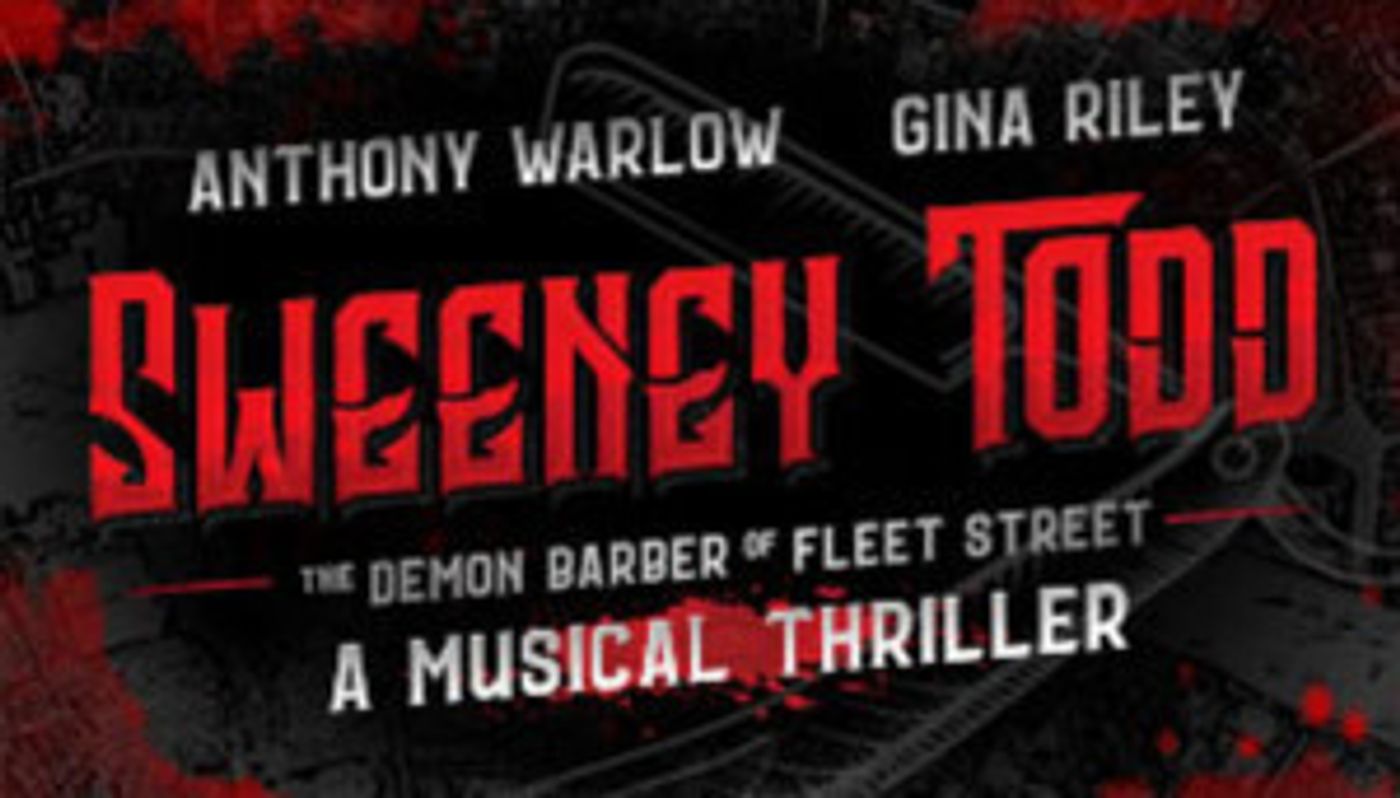
Thursday 13th June 2019, 7:30pm, Darling Harbour Theatre
Anthony Warlow returns to the Australian musical theatre stage to take on the dark twisted tale of SWEENEY TODD: THE DEMON BARBER OF FLEET STREET. In celebration of the 40th Anniversary of Stephen Sondheim (music and lyrics) and Hugh Wheeler's (book) multi award winning musical's Broadway premiere in 1979, director Theresa Borg presents the piece in an elaborately staged concert with a new twist.
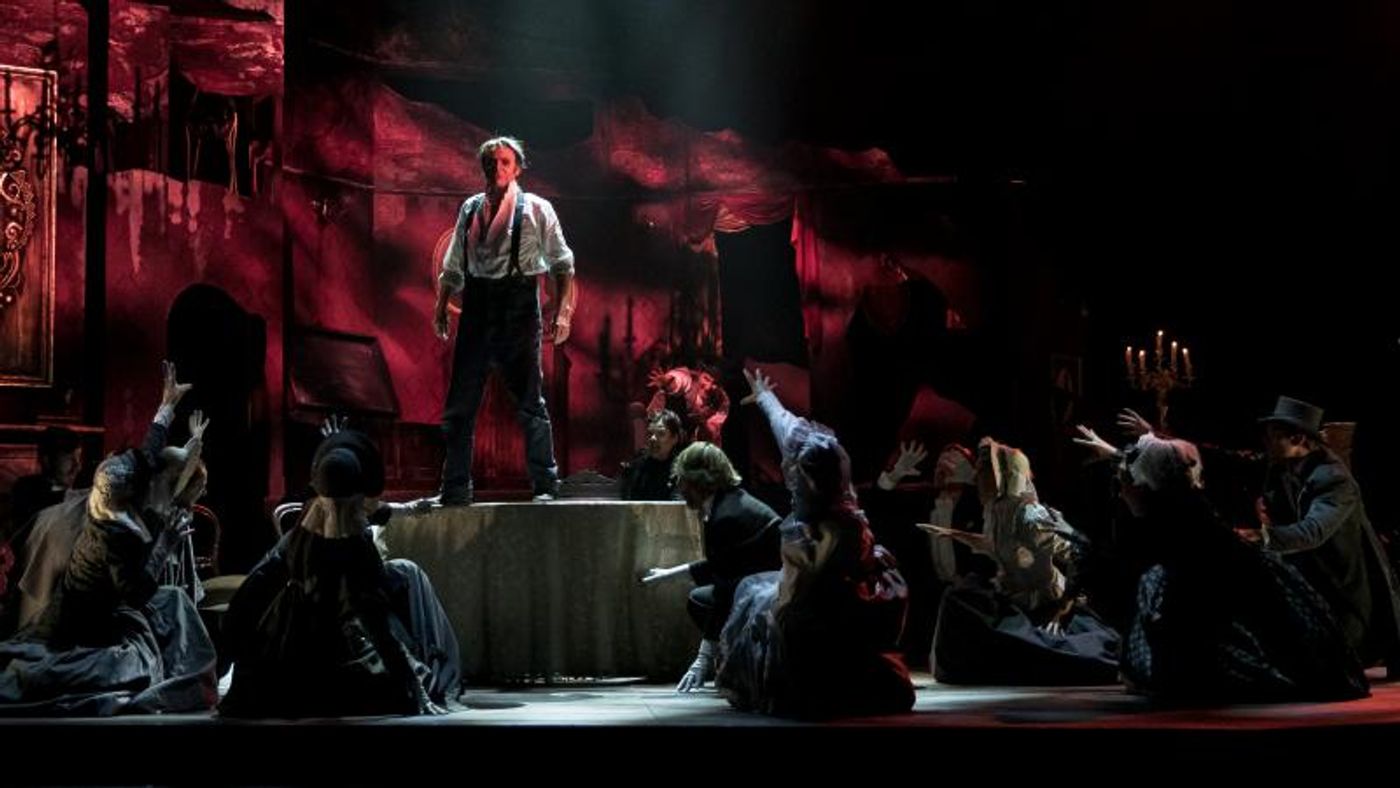 Sondheim and Wheeler's adaptation of Christopher Bond's play about the story of the murderous and vengeful barber and his opportunistic pie making landlady is well known as stemming back to the Victorian "Penny Dreadful" fiction magazines lending the story to the beautiful aesthetic of the era. While the story is generally told as a cautionary tale from beyond the grave with little preamble as to why Todd has returned, Borg has incorporated the 19th century trend of trying to contact the dead via Spiritualist led séance gatherings. A party of 5, led by the traditional female spiritualist have gathered in the ruins of a grand home, presumably once belonging to Todd's nemesis Judge Turpin.
Sondheim and Wheeler's adaptation of Christopher Bond's play about the story of the murderous and vengeful barber and his opportunistic pie making landlady is well known as stemming back to the Victorian "Penny Dreadful" fiction magazines lending the story to the beautiful aesthetic of the era. While the story is generally told as a cautionary tale from beyond the grave with little preamble as to why Todd has returned, Borg has incorporated the 19th century trend of trying to contact the dead via Spiritualist led séance gatherings. A party of 5, led by the traditional female spiritualist have gathered in the ruins of a grand home, presumably once belonging to Todd's nemesis Judge Turpin.
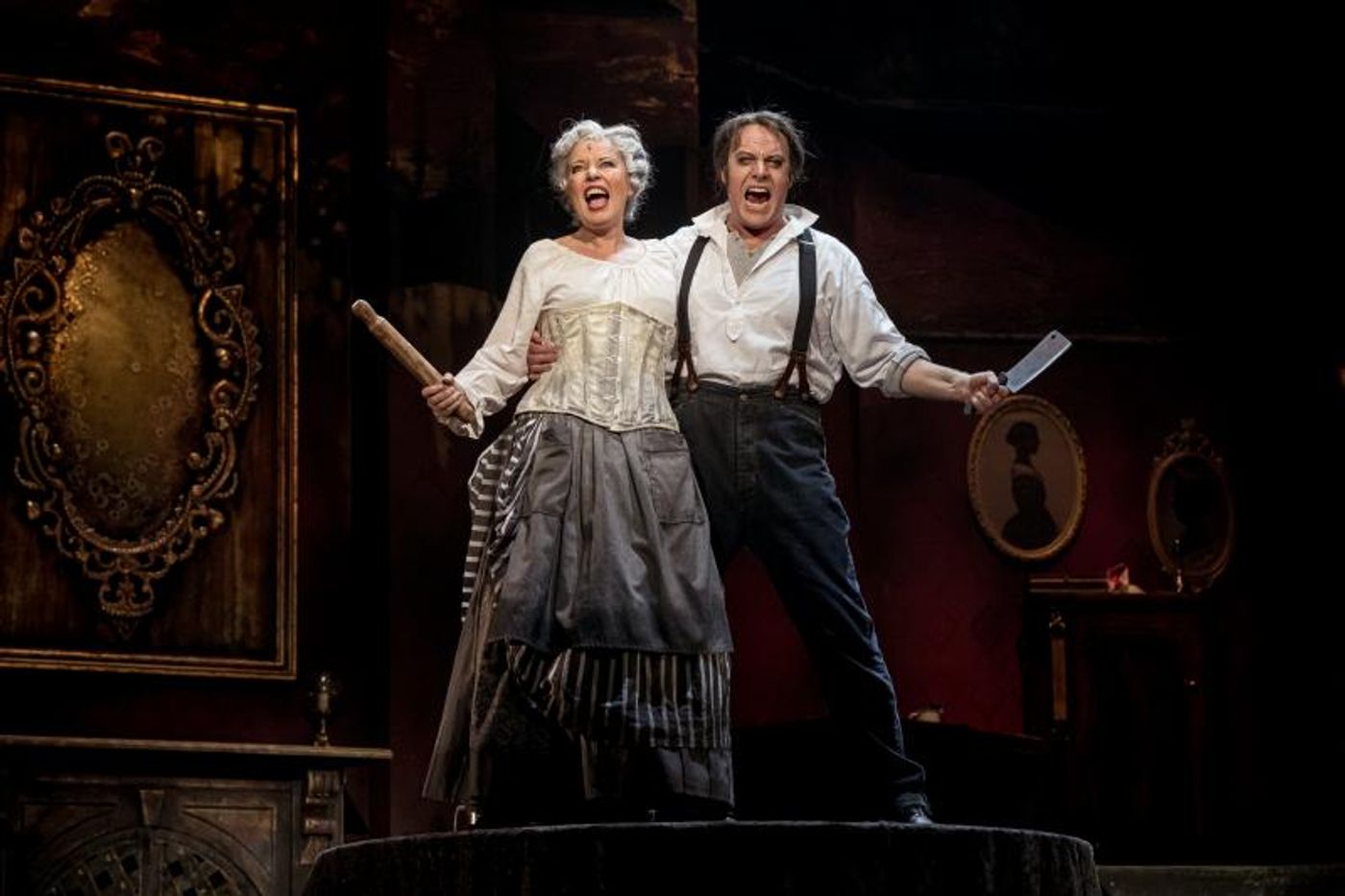 Set designer Charlotte Lane has created a detailed space for the staged concert. The remnants of the mansion dominate two thirds of the stage with Vanessa Scammell's (musical director and conductor) orchestra seated to the right of the space with raised catwalks weaving through 22 musicians. Kim Bishop's costume design merges the Victorian corsets and big skirts, sartorial suits and dockside simplicity with the premise of risen spirts. A monochrome tone is punctuated by remnants of ash and decay on coat edges to remind the audience which characters have been summoned from beyond.
Set designer Charlotte Lane has created a detailed space for the staged concert. The remnants of the mansion dominate two thirds of the stage with Vanessa Scammell's (musical director and conductor) orchestra seated to the right of the space with raised catwalks weaving through 22 musicians. Kim Bishop's costume design merges the Victorian corsets and big skirts, sartorial suits and dockside simplicity with the premise of risen spirts. A monochrome tone is punctuated by remnants of ash and decay on coat edges to remind the audience which characters have been summoned from beyond.
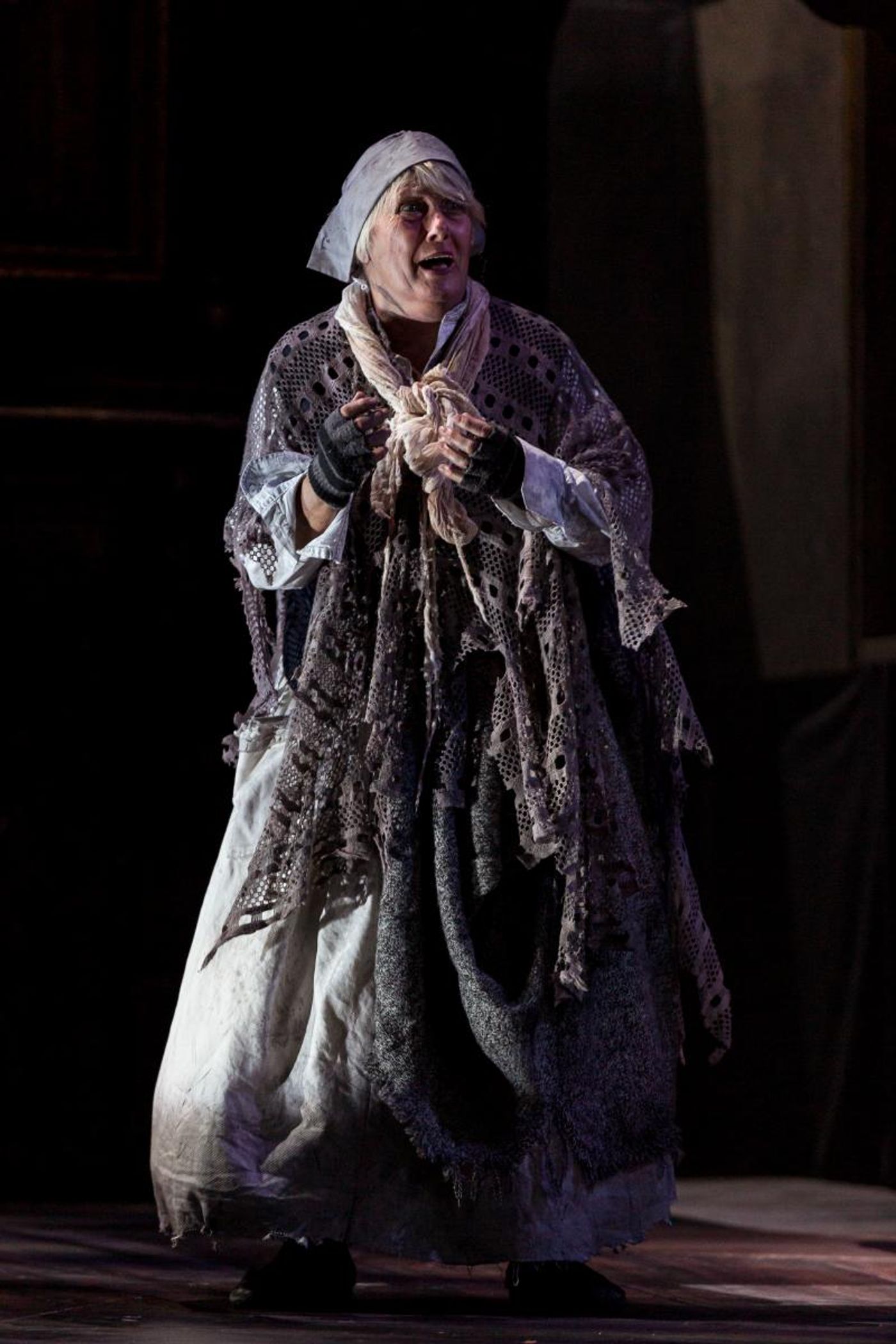 Problems however lie with the selection of venue which is an ultra-modern 'theatre' more suited to the convention lectures that would normally inhabit the ICC buildings. The lack of normal side lighting rigs has resulted in Lighting Designer Tom Willis resorting to gantries suspended over the curved side entrances which end up having the sides of the theatre illuminated rather than keeping focus on the stage. Issues with lighting design also extended to cues and clumsy transitions, particularly when trying to shift focus between Mrs Lovett's parlour below and Mr Todd's shop above. The venue also posed a problem for the first 20 minutes or so as loud noises from outside the theatre rumbled as if heavy furniture or equipment were being positioned in a neighboring venue. The lack of lockouts imposed by the producers and the venue also proved distracting as the entrance to the auditorium is via corridors that come out right near the stage and also cast additional light into the space. The lack of ability to completely drop the house lights also seemed to give several members of the audience the impression that it was acceptable to keep walking in and out of the theatre throughout the performance. Peter Grubb and Kelvin Gedye's (from System Sound) sound design also had significant issues with delays in adjusting microphones at multiple occasions. The positioning of the orchestra to the side of the stage and potentially too distant conductor monitors also resulted in mistiming of singers and orchestrations.
Problems however lie with the selection of venue which is an ultra-modern 'theatre' more suited to the convention lectures that would normally inhabit the ICC buildings. The lack of normal side lighting rigs has resulted in Lighting Designer Tom Willis resorting to gantries suspended over the curved side entrances which end up having the sides of the theatre illuminated rather than keeping focus on the stage. Issues with lighting design also extended to cues and clumsy transitions, particularly when trying to shift focus between Mrs Lovett's parlour below and Mr Todd's shop above. The venue also posed a problem for the first 20 minutes or so as loud noises from outside the theatre rumbled as if heavy furniture or equipment were being positioned in a neighboring venue. The lack of lockouts imposed by the producers and the venue also proved distracting as the entrance to the auditorium is via corridors that come out right near the stage and also cast additional light into the space. The lack of ability to completely drop the house lights also seemed to give several members of the audience the impression that it was acceptable to keep walking in and out of the theatre throughout the performance. Peter Grubb and Kelvin Gedye's (from System Sound) sound design also had significant issues with delays in adjusting microphones at multiple occasions. The positioning of the orchestra to the side of the stage and potentially too distant conductor monitors also resulted in mistiming of singers and orchestrations.
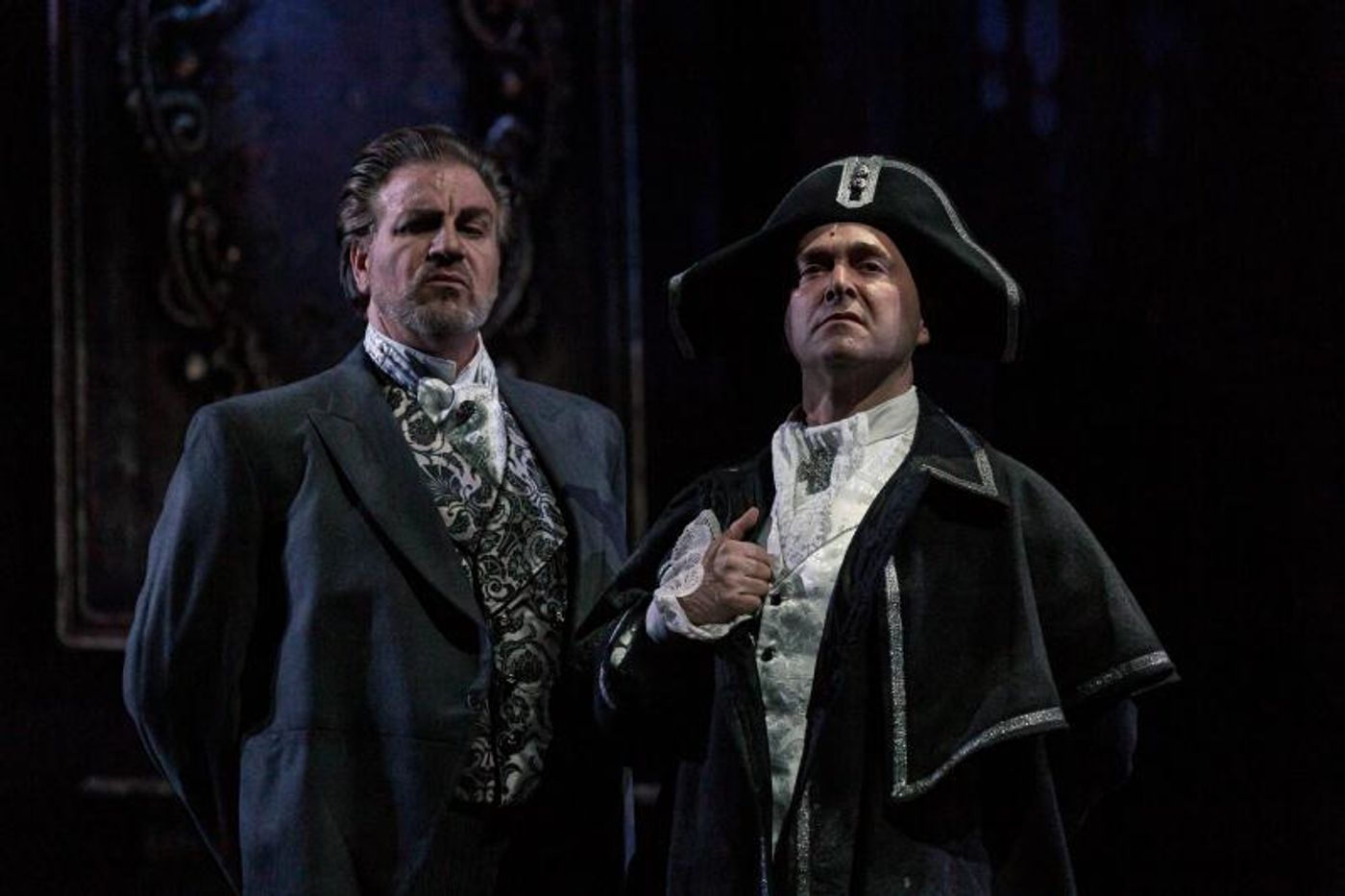 Anthony Warlow is naturally strong as the wronged barber. His vocals are wonderfully strong and rich whilst ensuring Sondheim's important lyrics are clear. His position as a seasoned musical theatre performer ensures that he knows how convey a connection with the character to present a performance that seems intuitive and natural. Daniel Sumegi's portrayal of Judge Turpin is similarly strong in both rich vocals and imposing but not overplayed dramatic expression. He ensures the aristocrat is easily reviled in his limited appearances. Tod Strike stepped into the role of rival barber Pirelli for opening night, delivering a delightfully camp expression of the charlatan in his brief appearances. Rounding out the standout performances is Jonathan Hickey's portrayal of Tobias Ragg, Pirelli's young assistant 'adopted' by Mrs Lovett. He exudes the innocence and loyalty of the young man with a credibility to make the audience believe that the boy isn't all that bright.
Anthony Warlow is naturally strong as the wronged barber. His vocals are wonderfully strong and rich whilst ensuring Sondheim's important lyrics are clear. His position as a seasoned musical theatre performer ensures that he knows how convey a connection with the character to present a performance that seems intuitive and natural. Daniel Sumegi's portrayal of Judge Turpin is similarly strong in both rich vocals and imposing but not overplayed dramatic expression. He ensures the aristocrat is easily reviled in his limited appearances. Tod Strike stepped into the role of rival barber Pirelli for opening night, delivering a delightfully camp expression of the charlatan in his brief appearances. Rounding out the standout performances is Jonathan Hickey's portrayal of Tobias Ragg, Pirelli's young assistant 'adopted' by Mrs Lovett. He exudes the innocence and loyalty of the young man with a credibility to make the audience believe that the boy isn't all that bright.
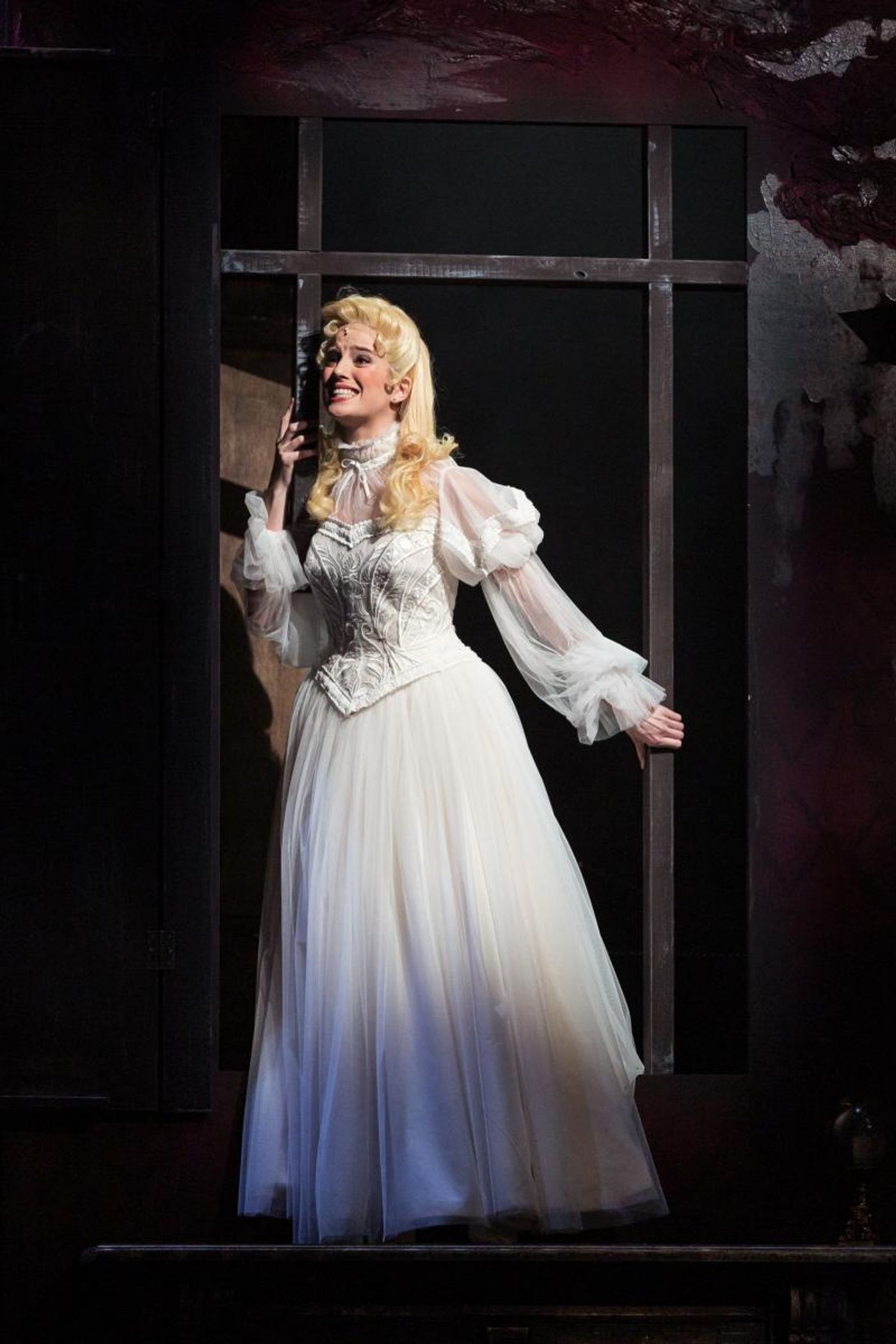 Unfortunately the female characters add to the problems of the piece. Borg has allowed Mrs Lovett (Gina Riley), Johanna (Genevieve Kingsford) and the Beggar Woman (Debra Byrne) to be overplayed without the requisite naturalism resulting in performances that give a sense of watching the direction. Riley, a performer known for her comic ability, presents a wooden and overly deliberate Mrs Lovett with vocals that are too often imperfect for a production of this scale. Sondheim's work is known for its complexity and need for precision whilst also having layered characters and requires a performer with both the musical ability and the dramatic skills to deliver the dark humor and unfortunately Riley isnt up to the challenge. Kingsford delivers a two-dimensional Johanna which is unable to be saved by her ringing soprano tones which ultimately lack the expected underlying tone of despair one would expect from the kidnapped young woman. Borg has failed to utilize Johanna's full potential, missing the opportunity to make the innocent character particularly likable. Byrne's portrayal of the Beggar woman is also over directed without any sense of honest mental health challenges but merely two different strategies to survive in the streets. Her limited lines are shrieked with little regard to the clarity of the underlying text.
Unfortunately the female characters add to the problems of the piece. Borg has allowed Mrs Lovett (Gina Riley), Johanna (Genevieve Kingsford) and the Beggar Woman (Debra Byrne) to be overplayed without the requisite naturalism resulting in performances that give a sense of watching the direction. Riley, a performer known for her comic ability, presents a wooden and overly deliberate Mrs Lovett with vocals that are too often imperfect for a production of this scale. Sondheim's work is known for its complexity and need for precision whilst also having layered characters and requires a performer with both the musical ability and the dramatic skills to deliver the dark humor and unfortunately Riley isnt up to the challenge. Kingsford delivers a two-dimensional Johanna which is unable to be saved by her ringing soprano tones which ultimately lack the expected underlying tone of despair one would expect from the kidnapped young woman. Borg has failed to utilize Johanna's full potential, missing the opportunity to make the innocent character particularly likable. Byrne's portrayal of the Beggar woman is also over directed without any sense of honest mental health challenges but merely two different strategies to survive in the streets. Her limited lines are shrieked with little regard to the clarity of the underlying text.
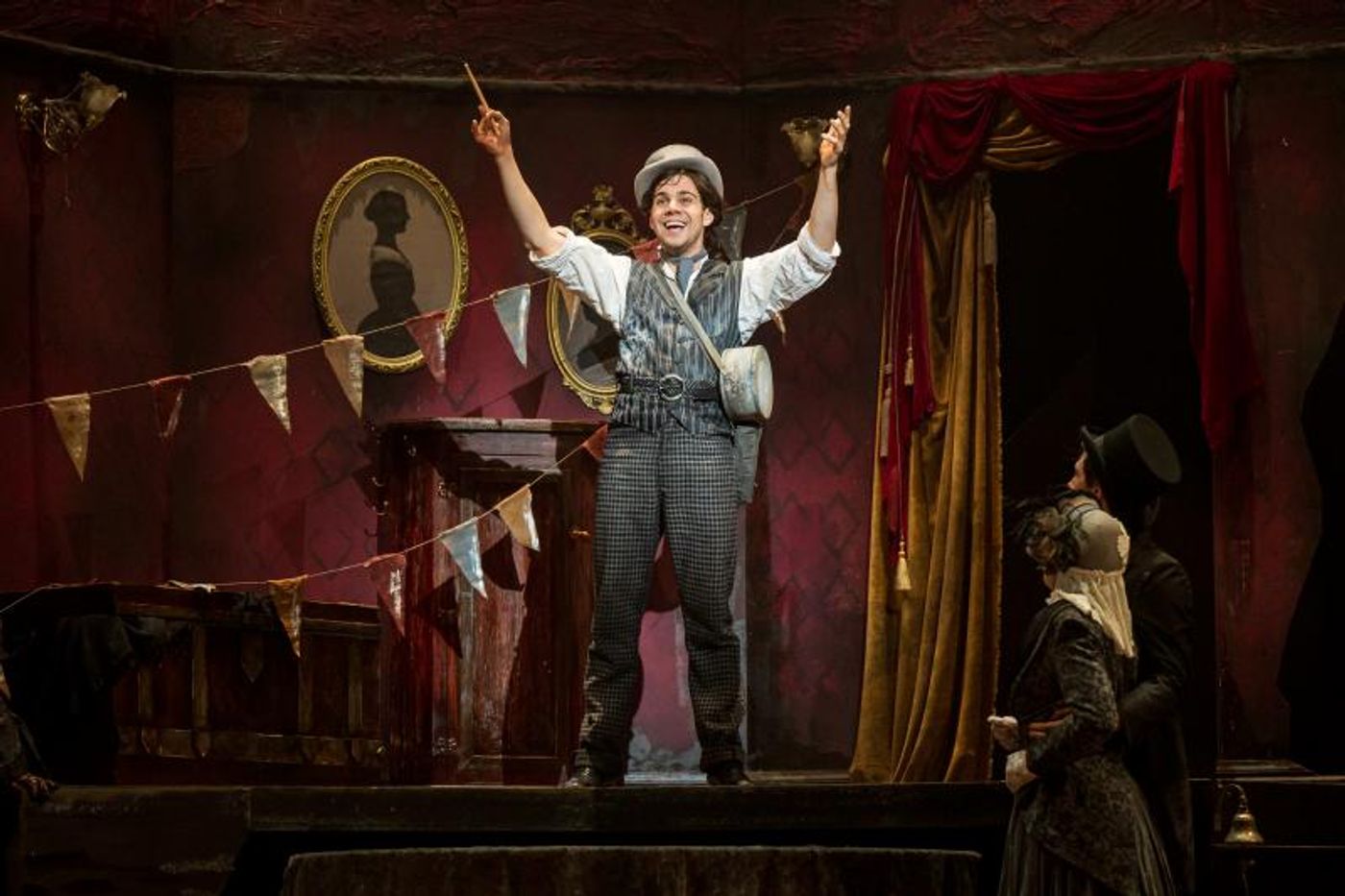 For a work that is not often performed due to its complexity, it is disappointing that this production is in a venue that is unsympathetic to the style of the work and the direction has failed to remove the unnatural, forced expressions that are further highlighted by the intuitive performances from other members of the cast. Hopefully as time progresses the performances may evolve and improve and the Melbourne venue should be better suited to the production style.
For a work that is not often performed due to its complexity, it is disappointing that this production is in a venue that is unsympathetic to the style of the work and the direction has failed to remove the unnatural, forced expressions that are further highlighted by the intuitive performances from other members of the cast. Hopefully as time progresses the performances may evolve and improve and the Melbourne venue should be better suited to the production style.
SWEENEY TODD: THE DEMON BARBER OF FLEET STREET
Photos: Ben Fon
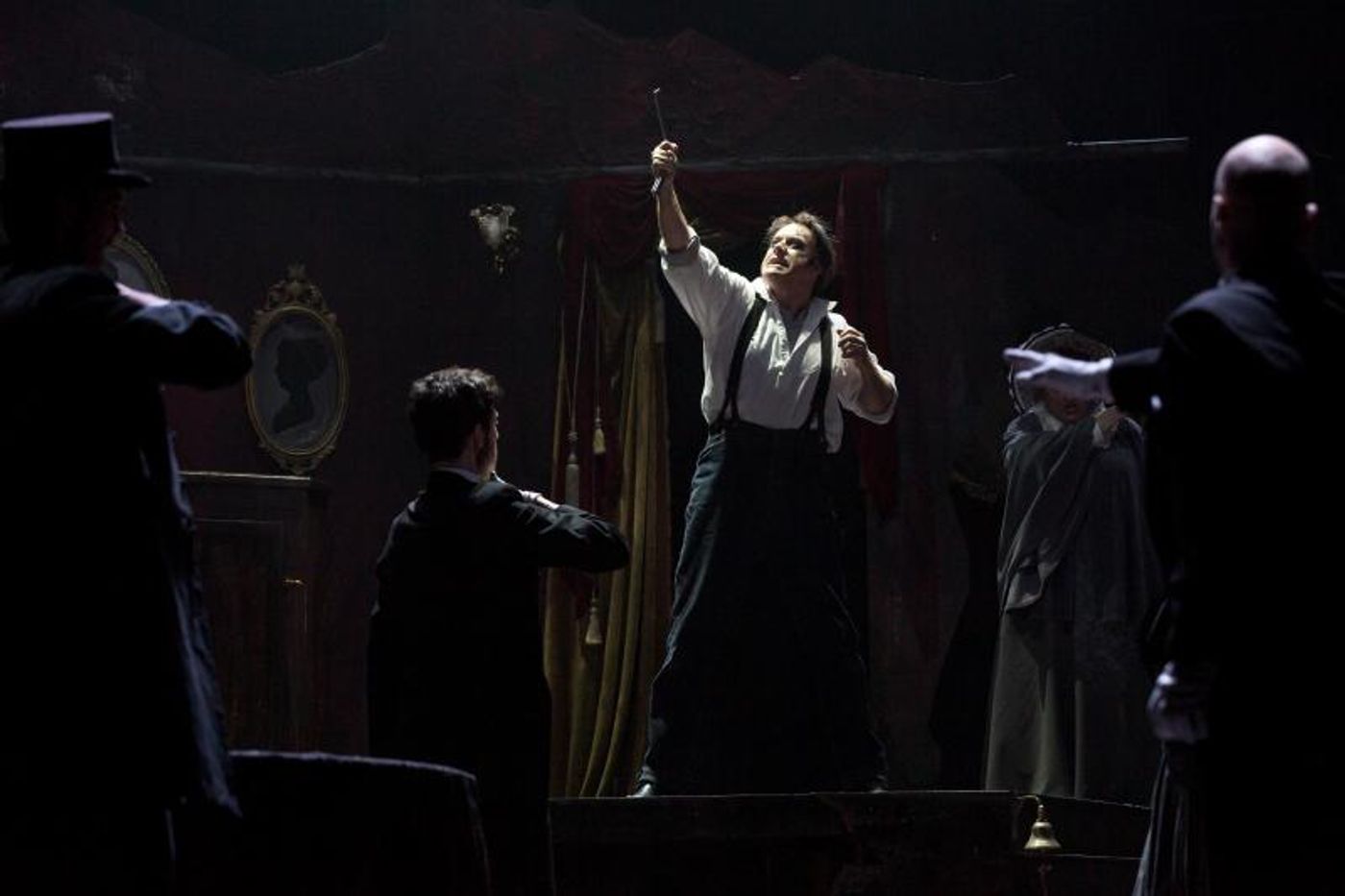
Videos

